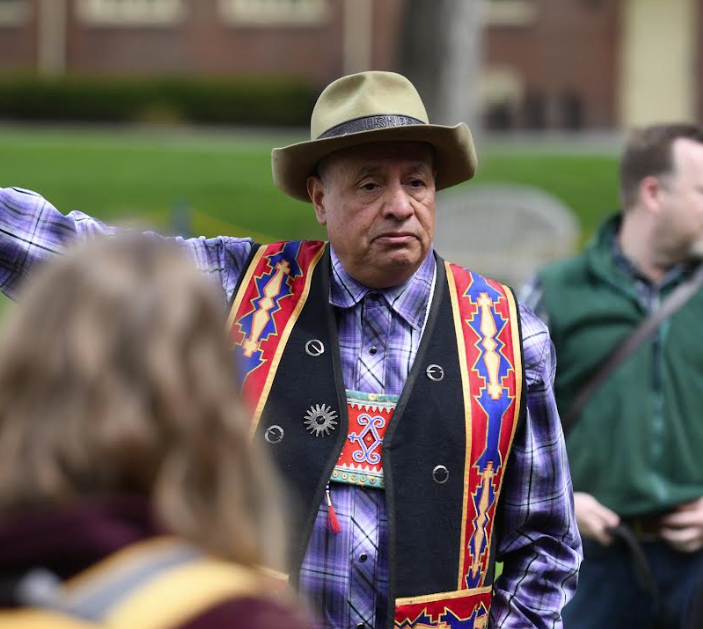
- Details
- By Native News Online Staff
Whitman College, a private, co-educational, residential liberal arts and sciences undergraduate college located in Walla Walla, Washington, has chosen Roger Amerman (Choctaw as the O'Donnell Visiting Educator in Global Studies for Spring 2024. Amerman is a distinguished alum of the Class of 1981.
Amerman recently served as a beadwork consultant for Marvel's Disney+ series Echo, featuring the Choctaw superhero Maya Lopez. Amerman's traditional beadwork, emphasizing tribal designs, is prominently showcased in Echo's attire. The meticulous process spanned five months, involving a thoughtful exchange of ideas and packages between Amerman and the Marvel team. Notable in Echo's ensemble is a Sun and Fire medallion, designed by Amerman, serving as a visual representation of Choctaw cosmology and spirituality, adorned with sacred ancestral symbols.
He will bring his talents to share to the college classroom that showcases the intersection of traditional Native American art with modern academia. A current resident of Stites, Idaho, Amerman brings a wealth of knowledge on Native American culture and history.
"Marvel is working closely with many Choctaw Nation individuals to ensure authenticity and true integrity. I look forward to seeing what tribal consultants in linguistics, weaponry, and other subjects contributed to the series." Amerman said.
While recognizing that Echo's outfits are not strict representations of Choctaw regalia, Amerman expresses enthusiasm for the potential of young kids wearing Echo-inspired clothing, providing an opportunity to explain the symbolism. Reflecting on the collaboration, he highlights Marvel's commitment to authenticity by closely working with Choctaw Nation individuals in various fields.
Following his work with Marvel, Amerman will teach an interdisciplinary Ethnogeology class at Whitman during Spring 2024. This unique course delves into the paleo-history, history, and ethnogeology of salmon-centric tribal peoples in the southern Columbia River Plateau. Amerman aims to "Indigenize" earth sciences by exploring traditional knowledge and customs related to landscapes. The course seeks to deepen students' appreciation for the intricate relationship between Indigenous knowledge and the land.
Amerman's dedication to connecting Indigenous understanding with academic education extends beyond the classroom. In 2022, he co-directed The Long Tent, a series celebrating Native American culture at Whitman. His involvement in the inaugural Pášx̣apa Powwow in November 2023, where his hand-beaded crown adorned the first Miss Pášx̣apa, further emphasizes his commitment to fostering authentic understanding of Choctaw heritage and Indigenous cultures through art and education. Navigating seamlessly between the realms of Marvel Cinematic University and Whitman College's academic community, Amerman creates a meaningful pathway for cultural appreciation and identity recognition.
More Stories Like This
Bard College Center for Indigenous Studies (CfIS) Hosts Annual Symposium With Keynote Speaker Miranda Belarde-Lewis on March 9–10American Indian College Fund Announces Spring 2026 Faculty Fellow Cohort
Navajo Nation Signs $19 Million Diné Higher Education Grant Fund Act into Law
Dr. Shelly C. Lowe to Be Inaugurated as IAIA President March 26–27
Tlingit Language Courses Expand for Students to Learn With Families At-Home
Help us defend tribal sovereignty.
At Native News Online, our mission is rooted in telling the stories that strengthen sovereignty and uplift Indigenous voices — not just at year’s end, but every single day.
Because of your generosity last year, we were able to keep our reporters on the ground in tribal communities, at national gatherings and in the halls of Congress — covering the issues that matter most to Indian Country: sovereignty, culture, education, health and economic opportunity.
That support sustained us through a tough year in 2025. Now, as we look to the year ahead, we need your help right now to ensure warrior journalism remains strong — reporting that defends tribal sovereignty, amplifies Native truth, and holds power accountable.
 The stakes couldn't be higher. Your support keeps Native voices heard, Native stories told and Native sovereignty defended.
The stakes couldn't be higher. Your support keeps Native voices heard, Native stories told and Native sovereignty defended.
Stand with Warrior Journalism today.
Levi Rickert (Potawatomi), Editor & Publisher


